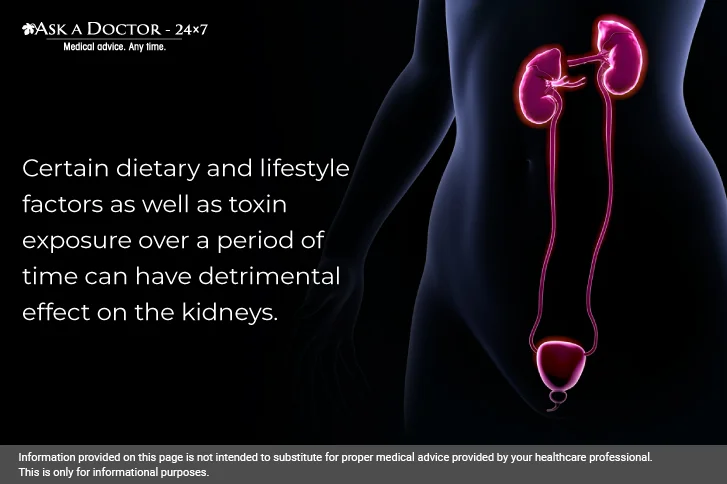Things You Should Know About Kidney Function And Ways To Protect It
The two little bean-shaped organs located just below the rib cage on either side of your body are the wonder organs. They work day and night allowing your body to function properly. Your very own filters, the kidneys purify the blood and remove extra fluid and wastes from the body. Your kidneys perform a plethora of functions that you may not even be aware of.
Each kidney is made up of about a million functional units or micro filters known as nephrons. Each nephron has two parts, a glomerulus and a tubule. The glomerulus filters your blood, and the tubule reabsorbs the needed substances into your blood and removes wastes in the form of urine.
Kidney disease is a major health concern. Unfortunately, often kidney disease is detected when the problem has advanced and there is a need for dialysis. Kidney disease is associated with problems such as high blood pressure, heart disease, weak bones, nerve damage, anemia, and even kidney failure.
7 Important Kidney Functions That You Must Know
Here are 7 important functions that your kidneys perform:
1. Removal of waste and extra fluid: The kidneys filter about 190 liters (200 quarts) of blood each day, out of which 1 to 2 liters of the excess fluid and wastes are excreted in the form of urine from the body. The wastes include by-products of metabolism such as urea, uric acid, ammonia, creatinine, hormone metabolites, and industrial, agricultural, and occupational toxins. Kidneys also remove excess nutrients or food constituents such as salt and water-soluble vitamins (vitamins B and C). Excretion of wastes and extra fluid by the kidneys prevents their accumulation in the blood and keeps the body healthy.
2. Regulation of blood pressure: The kidneys regulate fluid levels and secrete important hormones that transmit signals and control blood vessel constriction and relaxation. Under the hormonal control of the renin-angiotensin–aldosterone system, your kidneys maintain blood pressure.
3. Red blood cell production: The kidneys release a hormone, erythropoietin, which stimulates your bone marrow to produce red blood cells. These red blood cells transport oxygen from the lungs to all your body cells.
4. Acid-base balance: The kidneys maintain the acid-base balance of your body by reabsorbing the bicarbonate ions (HCO-3) into the bloodstream from your urine and by secreting hydrogen ions (H+) into your urine. By adjusting the right amount of acidic and alkaline ions, your kidneys maintain the pH of your body.
5. Bone health: The kidneys regulate blood levels of calcium and phosphorus. Both minerals are essential for strong bones. Your kidneys also activate the vitamin D obtained from food and sunlight to its active form, known as calcitriol. Vitamin D is needed for the intestinal absorption of calcium and phosphorus.
6. Stress response: On top of both the kidneys are the adrenal glands that regulate your stress response. The two most important stress hormones released by the adrenal glands are cortisol and adrenaline. During stressful events, cortisol boosts energy, regulates blood pressure, and increases your blood sugar. Adrenaline is involved in the ‘flight or fight’ response sending more blood to your muscles and making your heart beat faster.
7. Removal of drugs: Most drugs are eliminated from the body by the kidneys through the urinary route. They may either be excreted directly or in their metabolized form. Factors such as the condition of the kidneys, urine flow, and blood flow through the kidneys affect the kidneys’ ability to eliminate the drug.
Why Does Kidney Damage Happen?

Although kidneys are efficient in eliminating toxins from the blood, some toxins are difficult to be removed via urine. As a result, these toxins accumulate in the kidneys. As their concentration increases, they may cause damage to the kidneys.
Research shows that several factors can damage the kidneys over time. Some of these factors include:
- Inadequate blood supply to the kidneys
- Insufficient water consumption
- High dietary salt intake
- High phosphorus in diet
- High-fat meals
- Excessive use of non-steroidal anti-inflammatory drugs (NSAIDs)
- Smoking
- Exposure to heavy metals such as cadmium, mercury, lead and chromium
- Persistent exposure to herbicides and pesticides
- Poor blood sugar control
- High blood pressure
- Obesity
- Oxidative stress (a condition when there are too many free radicals or unstable molecules in the body and not enough antioxidants to neutralize them)
If you have any dietary or lifestyle-related disorders listed above and you are concerned about the health of your kidneys, you may Consult a Nutritionist online. However, for concerns related to your kidney function you can Ask a Nephrologist, anytime, at Ask a Doctor - 24x7.
How to Protect and Regenerate Your Kidneys
One of the most important factors that determines kidney function is the amount of blood supply to them. Loss in the quantity of blood or microcirculation of the kidneys lowers the glomerular filtration rate (GFR). GFR is a measure that represents how well your kidneys are functioning.
Many of the risk factors of chronic diseases are also the risk factors for low microcirculation of the kidneys, such as poor blood sugar control, high blood pressure, smoking, high-fat meals, obesity and oxidative stress.
You can protect your kidneys against damage by adopting certain lifestyle and dietary changes such as:
- Use organic vegetables and fruits
- Limit salt and phosphates in your diet
- Drink an adequate amount of water
- Avoid smoking
- Avoid high-fat foods
- Maintain ideal body weight
- Maintain optimum blood sugar level
- Control high blood pressure
All the above changes will help reduce the toxic load on the kidneys and ensure adequate microcirculation of the kidneys. In case you want to seek a personalized guidance, you can Ask a Nephrologist online.
You can improve the function of your kidneys and protect them against toxin damage by:
Increasing microcirculation of kidneys: Increasing blood flow to the kidneys improves detoxification and reduces oxidative stress. Studies have shown that beetroot juice and chocolate are particularly helpful in increasing blood flow to the kidneys.
Protecting kidneys against oxidative stress: The anthocyanins in blueberries that give them their purplish-blue color protect the kidneys against gut-derived toxins. Curcumin found in turmeric has a strong shielding effect against several toxins. Ginger has anti-inflammatory properties and decreases oxidative damage to the kidneys. An ancient herbal medicine, Ginko biloba, has also been found to have a protective effect against many types of toxins, including mercury, uranium, naphthalene, and glyphosate.
Ask a Nephrologist online to understand what changes you can make in your diet and lifestyle to have healthy kidneys. Connect with 18000+ doctors from over 80+ specialties at Ask A Doctor-24x7.
Recently Answered Questions Related to Kidney Health
- Suggest Treatment For Blocked Kidney
- Suggest Treatment For Kidney Cysts
- Is Epogen Safe To Take For Anemia With Kidney Injury?
- Suggest Risk With Kidney Reflux With Scars
- Can Kidney Stones Cause Damage To Kidneys?
- What are the Options of Treatment for Diabetic Renal Failure?
- Is Wine Consumption Advisable After Liver And Kidney Transplantation?
- Suggest Ayurvedic Diet For Polycystic Kidney Disease
- Is Long-term Potassium Citrate Intake Safe For Preventing Growth Of Kidney Stones?
Disclaimer: Information provided on this page is not intended to substitute for proper medical advice provided by your healthcare professional. This is only for informational purposes.
Ask a Specialist
Recent Questions


